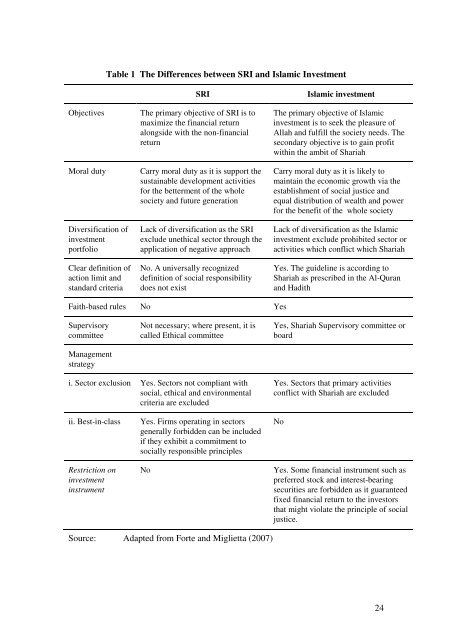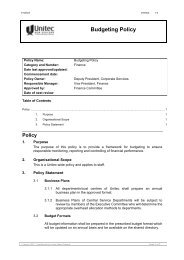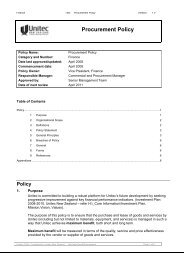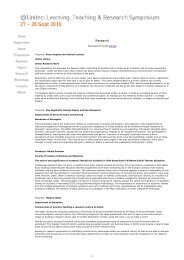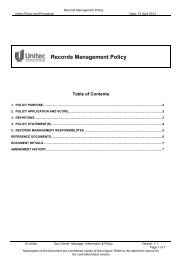RELIGION AND EARNINGS MANAGEMENT - Some ... - Unitec
RELIGION AND EARNINGS MANAGEMENT - Some ... - Unitec
RELIGION AND EARNINGS MANAGEMENT - Some ... - Unitec
Create successful ePaper yourself
Turn your PDF publications into a flip-book with our unique Google optimized e-Paper software.
Table 1 The Differences between SRI and Islamic Investment<br />
Objectives The primary objective of SRI is to<br />
maximize the financial return<br />
alongside with the non-financial<br />
return<br />
Moral duty Carry moral duty as it is support the<br />
sustainable development activities<br />
for the betterment of the whole<br />
society and future generation<br />
Diversification of<br />
investment<br />
portfolio<br />
Clear definition of<br />
action limit and<br />
standard criteria<br />
SRI Islamic investment<br />
Lack of diversification as the SRI<br />
exclude unethical sector through the<br />
application of negative approach<br />
No. A universally recognized<br />
definition of social responsibility<br />
does not exist<br />
Faith-based rules No Yes<br />
Supervisory<br />
committee<br />
Management<br />
strategy<br />
Not necessary; where present, it is<br />
called Ethical committee<br />
i. Sector exclusion Yes. Sectors not compliant with<br />
social, ethical and environmental<br />
criteria are excluded<br />
ii. Best-in-class Yes. Firms operating in sectors<br />
generally forbidden can be included<br />
if they exhibit a commitment to<br />
socially responsible principles<br />
Restriction on<br />
investment<br />
instrument<br />
The primary objective of Islamic<br />
investment is to seek the pleasure of<br />
Allah and fulfill the society needs. The<br />
secondary objective is to gain profit<br />
within the ambit of Shariah<br />
Carry moral duty as it is likely to<br />
maintain the economic growth via the<br />
establishment of social justice and<br />
equal distribution of wealth and power<br />
for the benefit of the whole society<br />
Lack of diversification as the Islamic<br />
investment exclude prohibited sector or<br />
activities which conflict which Shariah<br />
Yes. The guideline is according to<br />
Shariah as prescribed in the Al-Quran<br />
and Hadith<br />
Yes, Shariah Supervisory committee or<br />
board<br />
Yes. Sectors that primary activities<br />
conflict with Shariah are excluded<br />
No<br />
No Yes. <strong>Some</strong> financial instrument such as<br />
preferred stock and interest-bearing<br />
securities are forbidden as it guaranteed<br />
fixed financial return to the investors<br />
that might violate the principle of social<br />
justice.<br />
Source: Adapted from Forte and Miglietta (2007)<br />
24


